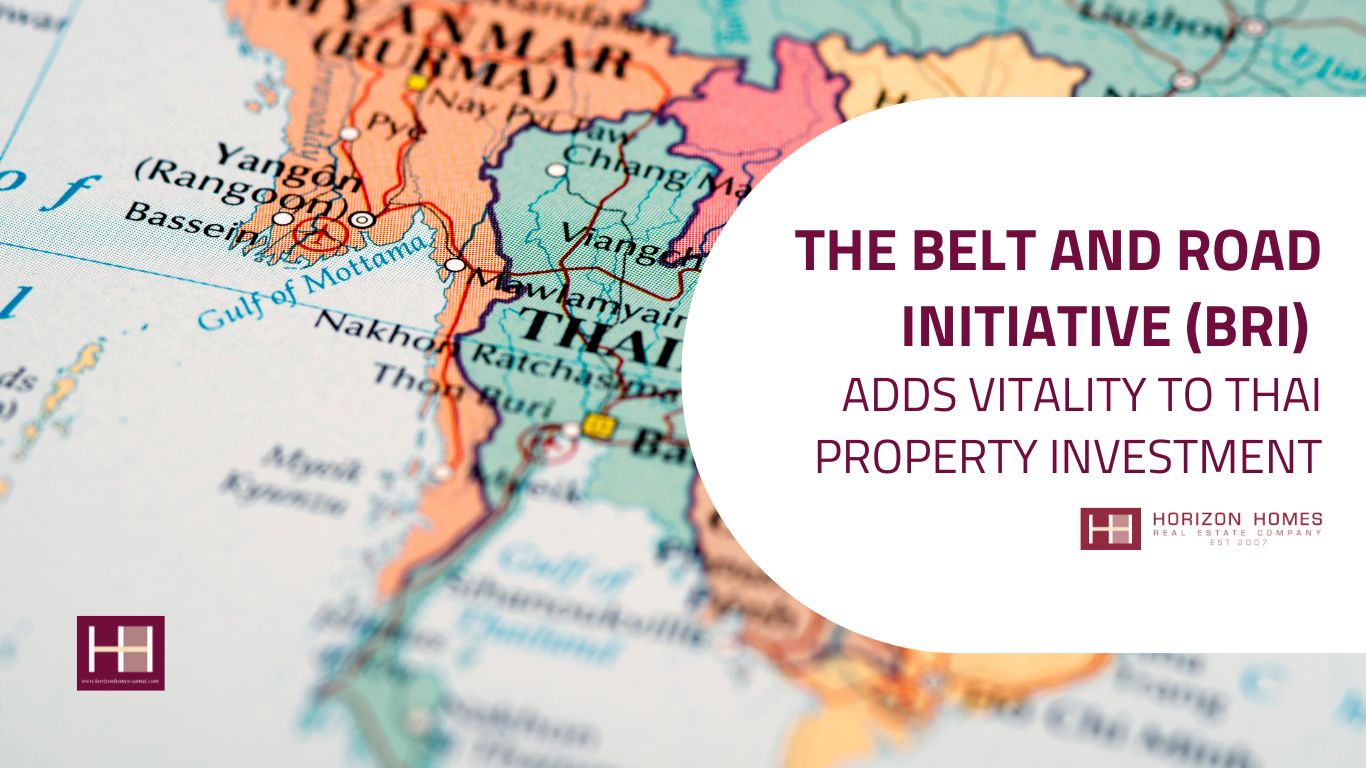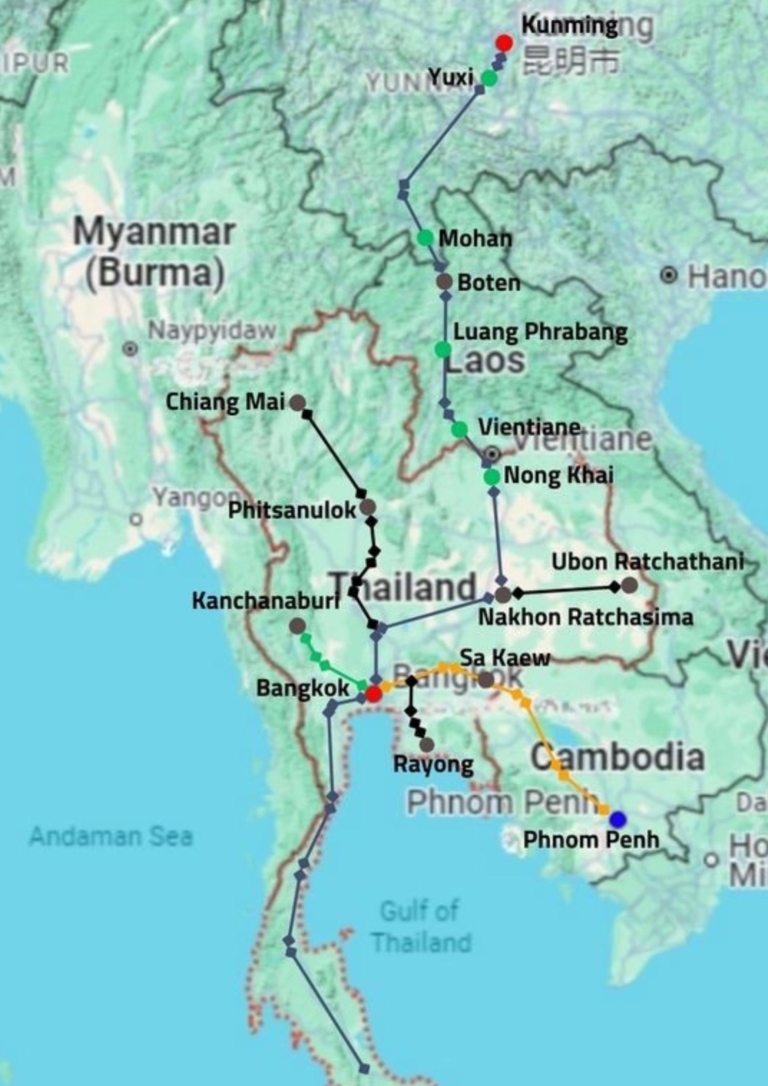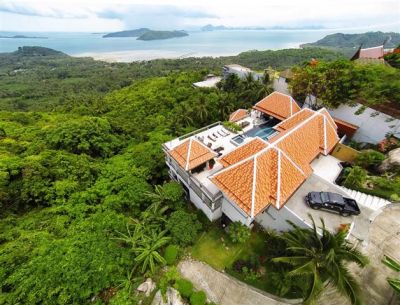The Belt and Road Initiative (BRI), launched by China, is an ambitious global infrastructure project aimed at improving trade routes and boosting economic development. One of the countries benefiting from the BRI is Thailand, particularly in the area of property investment. With its strategic location in Southeast Asia, Thailand has become a key player in the BRI network. As a result, the Thai property market is seeing increased interest from international investors.
Since the Belt and Road Initiative (BRI) was initially proposed, it has received positive recognition by the international community. The positive effects in the Asia-Pacific region have become increasingly prominent, especially in the field of overseas investment, as countries involved in the BRI have become much more attractive in the eyes of investors. Among these countries, Thailand’s real estate market has become extremely popular, attracting the attention of global investors.
The Belt and Road Initiative: A Global Infrastructure Push
The BRI’s main goals are to develop infrastructure, strengthen economic cooperation, and create new trade routes between Asia, Europe, and beyond. For Southeast Asia, the BRI is enhancing connectivity through projects like railways, ports, and industrial zones, making it easier for goods and people to move across borders. Thailand’s position as a transportation hub makes it essential to the success of the BRI, as the country connects China to the rest of Southeast Asia.
Thailand’s Property Market: An Attractive Investment Landscape
Thailand’s property market has become increasingly attractive, especially with the growth of infrastructure linked to the BRI. The demand for real estate has been rising, driven by both domestic and international investors looking to capitalize on future developments. Key property hotspots like Bangkok and the Eastern Economic Corridor (EEC) are seeing significant growth due to the influx of new infrastructure and economic activity.
Impact of BRI Infrastructure Projects on Thai Real Estate
The BRI is playing a big role in shaping Thailand’s real estate market. Major infrastructure projects, including rail links and new ports, are creating opportunities for property investment. For example, the high-speed rail project connecting Bangkok to neighboring countries is set to increase property values in areas along the route. Chinese companies are also investing in Thai industrial zones and residential projects, further boosting the property sector.
Benefits of the BRI for Property Investors
For property investors, the BRI brings several benefits. There is growing demand for residential, commercial, and industrial properties, especially near new infrastructure developments. Areas close to BRI projects are becoming prime investment spots due to improved accessibility and connectivity. This increased demand offers the potential for long-term capital appreciation, making Thailand an appealing market for both short-term and long-term investors.
Overseas home buyers are full of confidence
Political stability is still very important to buyers. Thailand is the second largest economy in Southeast Asia and the ASEAN Center, while the political environment is relatively stable. China’s BRI initiative has brought great opportunities for countries included to develop their economies. The Thai government has also expressed it’s full support for the BRI. With China’s development of infrastructure in Asia and the long-standing relationship between China and Thailand, many Chinese buyers are full of confidence when investing in Thailand.
The political system of Thailand is a constitutional monarchy. Standard & Poor’s sovereign credit rating gives Thailand a rating of A- and a stable rating outlook. The accelerated entry of Chinese investors into the Thai market is due to the welcoming attitude of the Thai government, the strong tourism market and superior investment potential.
7 bed Villa Sold Out in South West – HS0408
- ฿30,000,000
- Beds: 7
 yes
yes yes
yes- Villa
3 bed 3 bath Villa Sold Out in Choeng Mon – HS0786
- ฿13,000,000
- Beds: 3
- Baths 3
- Villa
Rich return on investment in different places
China’s new middle class is flooding into global real estate, and Thailand, as a global tourist destination, has a great appeal to these buyers, with a large number of assets available. Compared with the increasingly stringent housing purchase policies of cities such as Beijing, Shanghai, Guangzhou and Shenzhen, Thailand’s policies are becoming more attractive, with multiple avenues for ownership.
The continued attention of foreign investors will make the demand for real estate in Thailand even higher in the future. To give an example, among the foreigners holding a work permit in Bangkok Thailand, the Chinese rank second with 13%, after only Japan. Investors in Hong Kong and Singapore were once the main overseas buyers in Bangkok, and now more buyers from mainland China and Taiwan are flooding into the country.
Thailand’s tourism resources are very rich – the unique temples, white beaches, clear waters and low living costs bring the advantages and attract many tourists. In 2016, Thailand received 8.77 million Chinese tourists, bringing in 8.56 billion THB to the country. For investors, Thailand’s holiday villas and apartments, hotels, timeshare properties and other development projects are attractive propositions.
Challenges and Risks
Challenges for Foreign Investors in Thailand under the BRI:
Complex Local Regulations: Foreign investors must navigate Thailand’s local regulations, which can be intricate and vary by region or sector.
Economic Factors: Global trade tensions or currency fluctuations may affect the profitability of investments, particularly in the property market.
Environmental and Social Concerns: Large infrastructure projects may have environmental and social impacts, raising concerns about the long-term stability of certain investments.
Conclusion
The Belt and Road Initiative has had a positive impact on Thai property investment, driving growth in key areas of the country. Thailand’s role as a central player in the BRI has made it an increasingly attractive destination for international investors. With ongoing infrastructure projects, the future of Thailand’s property market looks promising, offering opportunities for those looking to capitalize on the growth driven by the BRI.







